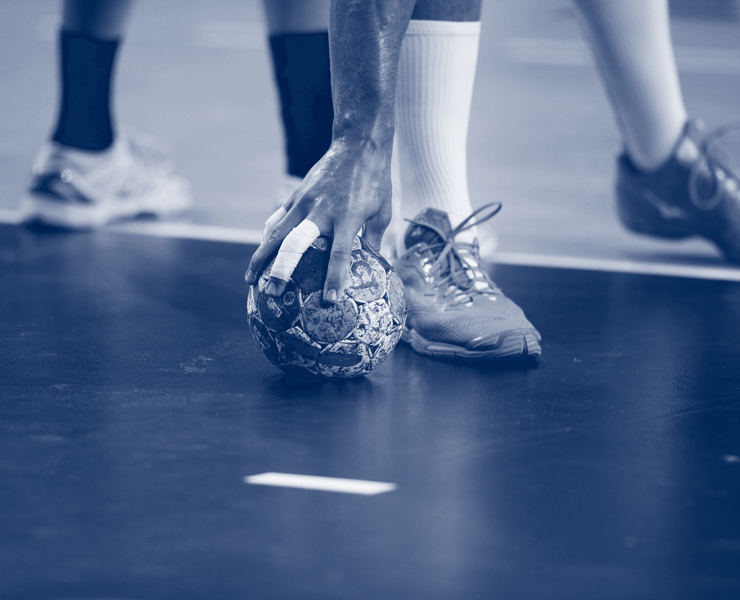
Play in Romania to resume slowly but surely
11 March 2020. The COVID-19 pandemic was still in its early stages in Romania, but strong restrictions were already applied as cases mounted.
One of the measures was limiting every indoor meeting to a maximum of 100 members.
Therefore, there was an eerie silence in the Polivalenta Arena in Bucharest, where CSM Bucuresti hosted SCM Ramnicu Valcea in a deciding match for the Romanian women’s league.
Besides players, team staff and medical staff, there were only 13 journalists allowed in the arena, 10 of them were actually able to attend the game courtside.
CSM won by the slightest of margins, 23:22, to tie Valcea in the standings, but also had a game in hand.
Three months later, the Romanian Handball Federation (FRH) decided that both leagues – men and women – were cancelled, with no title awarded, as there were still seven games in the women’s league and a play-off to be played in the men’s competition.
However, both Valcea and CSM Bucuresti qualified for the DELO EHF Champions League, which will start in September.
Finishing every competition on the court
Romania was one of the first European countries to impose a stringent lockdown, as the president declared a state of emergency for two months in early March, with no sporting competitions allowed.
As the country emerged from the lockdown in May, handball’s status, as an indoor sport, was still carrying a huge question mark.
“We wanted to finish every competition we could on the court. It was difficult to achieve this, but I think we did our best in this tough situation,” said Cristina Varzaru, the secretary general of the FRH.
With the thoughts also on the women’s national team, which is due to play the EHF EURO 2020 in December, and whose core is largely based in Romania, something had to give.
In July the FRH entered a lengthy discussion with the Health Ministry, which gave the green light for handball to resume in September, the first indoor sport in Romania to do so.
“Our strategy was to finish the competitions on the court, if that was possible. Both Romanian cups will be played in September and this is very important for us,” said Varzaru.
There are still six games to be played in the women’s cup, which will take place between 3 and 6 September in Bucharest, while the men’s cup is due to be played in Sfantu Gheorghe in a final-four format.
The promotion play-offs for the past season will also be played in a tournament, as well as the first three games in the men’s league, all in Sfantu Gheorghe, on consecutive days.
“A very complicated process”
However, there were sacrifices to be made. No fans are allowed in Romania at any sport event whatsoever and all games are due to be played behind closed doors.
“It was a very complicated process, because the costs are big and home advantage is conceded in this situation. But we vowed to get back to playing handball and this is a small sacrifice to be made,” said Varzaru.
In the current timeline, both Romanian domestic leagues will be played in bubble-type tournaments for the foreseeable future, but the plan is to revert to normal at the midway point of the leagues.
While the men’s competition has free space in the calendar, Liga Florilor, the women’s league, has a big question mark surrounding the availability of top teams.
As SCM Ramnicu Valcea and CSM Bucuresti will take part in the DELO EHF Champions League on a weekly basis, it is impossible for those two sides – arguably the strongest in the domestic competition – to adhere to this format.
All teams were on board with the situation, as indoor training sessions have been banned by the local legislation, while teams have resorted to non-contact trainings on stadiums.
“There will be strict protocols, with players and staff getting tested 14 days prior to the start of the tournament and with two days before entering to so-called bubble in the tournament,” added Varzaru.
“We made the best out of an impossible situation, because we saw there were positive cases in many other countries and teams had to stop their preparations,” concluded the secretary general of the FRH, a former DELO EHF Champions League top scorer for Viborg in 2009.
Rust to dust off
The uncertainty also impacted those teams’ preparations, as Valcea and CSM will start the DELO EHF Champions League in the second week of September.
Opponents such as Rostov or Györ have already played several competitive games this season and will have an advantage, yet the Romanian sides are happy that they will have some games under their belt.
The two powerhouses are set to meet in the cup final on 6 September, one week before their respective starts in Europe’s premium competition.
“We are constantly adapting our training schedule, but I am happy about how the training worked until now. Having actual games to play before the start of the European premium competitions is a very big plus for us,” said Adrian Vasile, CSM Bucuresti’s coach.
There will surely be rust to be dust off following a six-month hiatus, yet the light is there to be seen and everybody is happy to be back on the court.
While Romanian handball might have emerged last from the ongoing COVID-19 pandemic, the bar is set high both for club teams in European competitions and for the women’s national team at the EHF EURO.
“We must get back to our old life in handball, one way or the other. It is what the players, the fans and the clubs want,” said Varzaru. “Hopefully, it will be better than before.”






